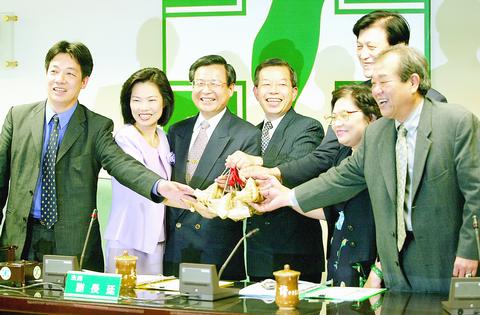To prepare for the possibility of a "two-party" system after the year-end elections, the DPP yesterday held the first of a series of debates on whether an alliance would be beneficial to the party.
There has been talk recently in political circles of an alliance forming between former president Lee Teng-hui (李登輝) and President Chen Shui-bian (陳水扁), creating the so-called Lee-Bian alliance.

PHOTO: CHEN CHENG-CHANG, TAIPEI TIMES
In addition, KMT Chairman Lien Chan (
DPP members met yesterday to debate potential outcomes of an alliance with Lee and the possibility that Taiwan politics may be headed for a political arrangement that resembles a two-party system.
Members of the pro-alliance debate team included party Secretary-General Wu Nai-jen (吳乃仁), central standing committee member Liu Shih-fang (劉世芳) and legislator Cho Jung-tai (卓榮泰).
Debating the negative side were legislator Shen Fu-hsiung (
In yesterday's discussion, which was held behind closed doors, Kuo said that he believed there would be three disadvantages to the DPP should politics split into Lee-Bian and Lien-Soong camps.
First, pro-Lee candidates could siphon away DPP votes, hurting the party's candidates.
Second, Kuo said, a Lee-Bian alliance would limit the party's ability to align with other opposition parties, as everyone else would have chosen sides after the elections.
Third, a Lee-Bian alliance could intensify ethnic and ideological confrontation in Taiwan -- such as the issues of Taiwan independence and unification with China -- to the party's disadvantage.
In support of Kuo's view, Shen said the party should not take the risk of asking voters to take sides because they might not choose the DPP, adding they risked losing their middle-of-the-road supporters.
But Cho, speaking on the pro side, said "the DPP would likely win an absolute majority to maintain political stability if two major political alliances, not necessarily two parties, have been forged."
He said that the party, before the year-end elections, should clearly declare whom it wants to become a partner with or cooperate with.
Cho also urged the DPP not to overemphasize the pro-Taiwan angle.
Instead, he said the party's record on "black gold" politics should be stressed in order to differentiate the DPP from Lien and Soong.
The DPP plans to hold five more discussions to debate topics. These are to cover partisan confrontation, the DPP government's achievements and faults, the timetable for implementation of the three major links and also the current economic downturn.
Conclusions drawn from the debates will be prepared as reference materials for DPP officials who are invited to attend call-in shows and defend the party's policies.

The CIA has a message for Chinese government officials worried about their place in Chinese President Xi Jinping’s (習近平) government: Come work with us. The agency released two Mandarin-language videos on social media on Thursday inviting disgruntled officials to contact the CIA. The recruitment videos posted on YouTube and X racked up more than 5 million views combined in their first day. The outreach comes as CIA Director John Ratcliffe has vowed to boost the agency’s use of intelligence from human sources and its focus on China, which has recently targeted US officials with its own espionage operations. The videos are “aimed at

STEADFAST FRIEND: The bills encourage increased Taiwan-US engagement and address China’s distortion of UN Resolution 2758 to isolate Taiwan internationally The Presidential Office yesterday thanked the US House of Representatives for unanimously passing two Taiwan-related bills highlighting its solid support for Taiwan’s democracy and global participation, and for deepening bilateral relations. One of the bills, the Taiwan Assurance Implementation Act, requires the US Department of State to periodically review its guidelines for engagement with Taiwan, and report to the US Congress on the guidelines and plans to lift self-imposed limitations on US-Taiwan engagement. The other bill is the Taiwan International Solidarity Act, which clarifies that UN Resolution 2758 does not address the issue of the representation of Taiwan or its people in

US Indo-Pacific Commander Admiral Samuel Paparo on Friday expressed concern over the rate at which China is diversifying its military exercises, the Financial Times (FT) reported on Saturday. “The rates of change on the depth and breadth of their exercises is the one non-linear effect that I’ve seen in the last year that wakes me up at night or keeps me up at night,” Paparo was quoted by FT as saying while attending the annual Sedona Forum at the McCain Institute in Arizona. Paparo also expressed concern over the speed with which China was expanding its military. While the US

SHIFT: Taiwan’s better-than-expected first-quarter GDP and signs of weakness in the US have driven global capital back to emerging markets, the central bank head said The central bank yesterday blamed market speculation for the steep rise in the local currency, and urged exporters and financial institutions to stay calm and stop panic sell-offs to avoid hurting their own profitability. The nation’s top monetary policymaker said that it would step in, if necessary, to maintain order and stability in the foreign exchange market. The remarks came as the NT dollar yesterday closed up NT$0.919 to NT$30.145 against the US dollar in Taipei trading, after rising as high as NT$29.59 in intraday trading. The local currency has surged 5.85 percent against the greenback over the past two sessions, central